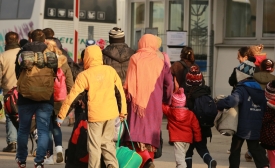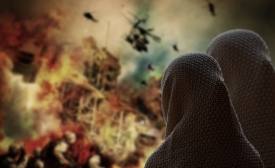syria
International Medical Corps, established in 1984, and where I currently work, is a global, humanitarian, nonprofit organization dedicated to saving lives through health care training and relief. In order to spread awareness about the Syrian refugee crisis, International Medical Corps went one step further by using visual storytelling to provide a voice for refugees. “The Things We Carry” campaign, launched in March 2017 by International Medical Corps and the Conrad N. Hilton Foundation is an effort to keep public attention on the ongoing crisis in Syria.

Laurence Desroches discusses a new digital storytelling campaign designed to bring attention to Syrian refugees.
The US permanent Ambassador to the United Nations, Nikki Haley, visited Turkey and Jordan to see the humanitarian challenges both countries face and to hear possible solutions for the humanitarian situation in war-torn Syria. [...] Earlier on Tuesday, Haley visited a UNICEF treatment facility that was providing emotional support to refugee children from Syria. “Today we visited a health center that trains Syrian doctors and nurses to practice medicine in Turkey, helping their fellow refugees.” Haley wrote on Twitter.
President Donald Trump's U.N. ambassador called Monday for the U.N. and aid agencies to shift focus in how they support Syrians in need by boosting support for roads, schools and hospitals in neighboring countries that have been overwhelmed by millions of refugees. Speaking in Jordan, host to some 660,000 Syrian refugees, Nikki Haley argued that lack of coordination among aid agencies has led duplicated efforts and inefficiencies after seven years of civil war in the Arab country.
Syrian students and academics scattered by war have had their careers and education disrupted. We spoke to the founder of the Jamiya Project, which is trying to reconnect Syrian academics to refugee students through blended online and in-person learning. Syria's Higher Education sector has been wrenched apart by the war. Once-flourishing universities have lost professors, students and facilities to violence and the exodus of 5 million people from the country.
At the stringing table, most of the women wear hijabs. Natives of Syria, Iraq, Iran and Afghanistan, they have been in the U.S. less than two years, arriving in Houston through Interfaith Ministries of Greater Houston's refugee services program. They speak Arabic, Farsi, Pashto or Dari. Which is to say, they sometimes speak with each other only slightly better than they can talk with me.
Doing nothing when war crimes are committed is immoral. It is also bad policy. But a response to war crimes such as those perpetrated by the Syrian regime of Bashar al-Assad must be more than a display of righteousness; it must become an element of a broader foreign policy initiative. This is the challenge facing the Trump administration after the missile strike launched by the United States

Could the missile strikes on Syria enhance U.S. soft power? Philip Seib considers the possibility at the CPD Blog.







